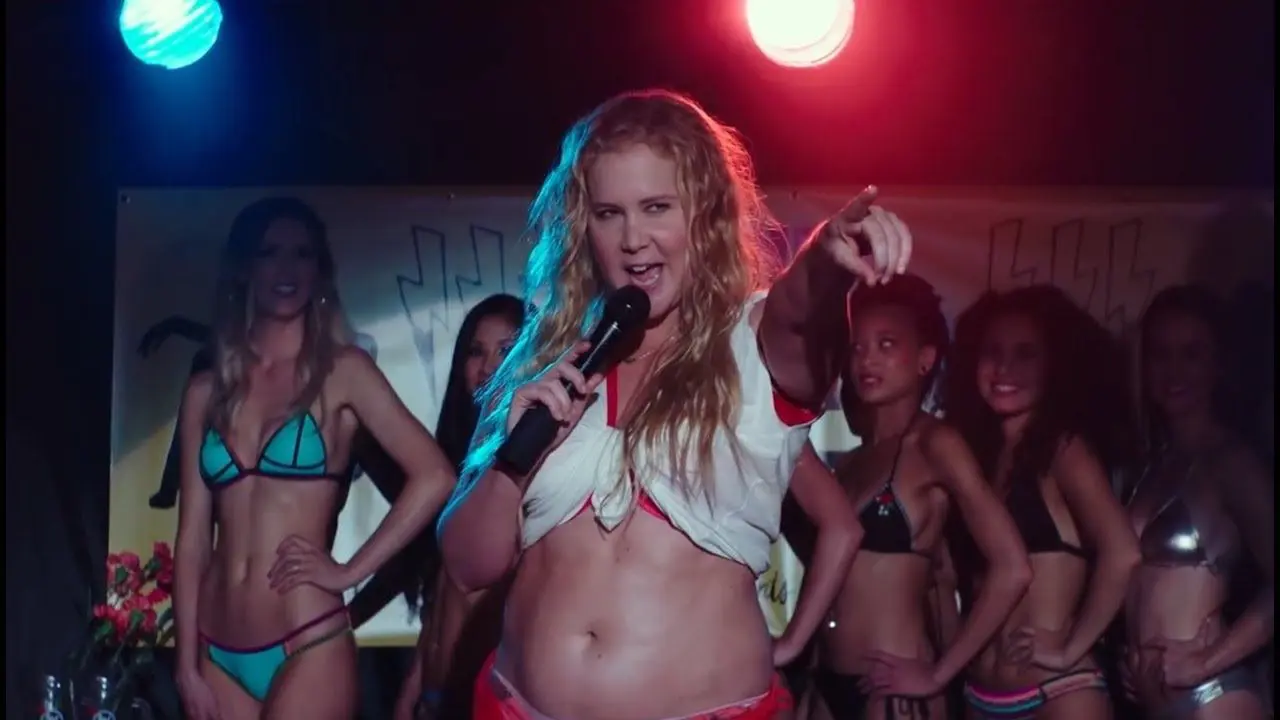Summary
Through a spin class accident with amnesia-like results, all of Renee Bennett’s insecurities are stripped away in this mixed-message pseudo-romantic comedy starring Amy Schumer, Michelle Williams, Rory Scovel, and Busy Philipps.
I’m rather intensely torn by I Feel Pretty and did more than my share of convicted thinking before sitting down to write this review. It has major problems in its writing and execution, but it also possesses a message backed by a deep emotion with which many, many people will be able to connect.
I love the premise, which explores the difficulty of being a woman in today’s world, full of insecurities while fighting upstream in a world of cosmetics and judgment. Renee is intensely insecure and superficial, dwelling myopically on outward appearances throughout the film.
Appearances define her. She has a horrible webmaster job in the basement of a building in New York City’s Chinatown, but she’s cultivated a perfectly appointed work area. She and her friends try online dating and dwell on taking pictures for their profiles. She jealously judges model-like women around her, objectifying them just as much as many men do. And then everything changes.
In a plot turn firmly inspired by Shallow Hal and Freaky Friday, Renee makes a wish at a fountain and then hits her head the next day while at a spin class. When she comes to, she sees herself in the mirror and realizes that she’s beautiful – but no physical transformation has taken place. It’s all in her head. She literally believes people are seeing her as an entirely different person. This is where the unevenness of the film comes in, while also introducing its most potent theme.
On one hand, I Feel Pretty sends a clear message: it’s your confidence and inner beauty that counts. Your self-image is largely a social construct foisted upon us from adolescence, and we’re all desperately trying to achieve some kind of artificial ideal. Once Renee thinks she’s beautiful, her worries are stripped away, and Amy Schumer (The Humans; Life & Beth) plays much of this with earnestness and comic aplomb. She’s truly a delight, through and through.
But there are also a lot of issues with these changes. While she has gained a significant portion of confidence, allowing her to rise at the cosmetics company she works for (even the choice of career indicates the character’s skin-deep focus), her superficiality is supercharged.
She lectures her friends who are trying to connect with dates: “Be hotter. Just lead with your hotness. Then let them find out how boring you are later.” She quickly loses her friends, gets a boyfriend, then almost cheats, then hits her head again and turns back to normal. And this is where the film hits its stride. Everything culminates in a speech about all the things foisted upon girls throughout their lives that pull apart their confidence. And it’s a great moment in the film.

Amy Schumer in ‘I Feel Pretty’
The worst part is that, amidst the excellent message about self-image and inner beauty, the comedy still works firmly on the assumption that we all actually think Amy Schumer is horribly ugly. The movie truly asks us the question: how in the world could the audience ever think that Amy Schumer is even slightly attractive? This inadvertently undercuts so much that the film tries to work toward. So, what’s the message? Be a delusional jerk who makes a bikini contest into a wet T-shirt contest and be ok with losing it because you feel good about yourself? I hope not.
Such pains are taken to establish Renee’s amazing talent and personality, getting us to the point of realizing she is beautiful, that while she doesn’t have the model’s body or looks, she’s a real woman. And yet much of the comedy is based upon stupid Shallow Hal gags: every time she walks into a room people literally stare at her, mouths agape, clearly thinking she’s muck on the bottom of their boots.
I would be deeply remiss if I didn’t mention Michelle Williams, who is nearly unrecognizable and amazing in her strange aloofness and even stranger voice. Again, the movie undermines itself as she goes through an inexplicable character change about 1/3 of the way through the movie. It’s a change for the better that I really love, but it doesn’t make sense and it’s not well-developed.
In the end, I truly applaud I Feel Pretty for taking aim at society’s objectification of women. I’m a teacher, and I see what social media, YouTube, and the entertainment industry earnestly tries to do to their self-esteem, digging deeply at their every seeming flaw, overtly or not. For that, I Feel Pretty‘s ultimate message rings true – I just wish that it had not subverted itself so regularly.
Amy Schumer Stand-Up Comedies:




